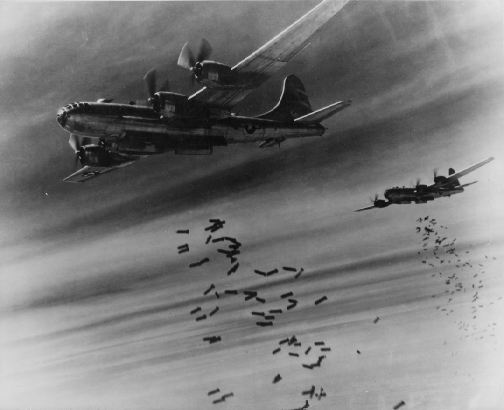
(出展:Wikipedia)
明日3/10は、約10万人の民間人犠牲者が出た東京大空襲があった日です。
※空襲自体は100回近く行われていますが、最も犠牲者が多かった3/10を「東京大空襲」として扱います。
- 中立な立場
- 過去と未来の両方を見据えている
- コンパクトに要点を押さえている
という点で印象的だったので、紹介します。
「骨まで燃やし尽くされる」
MANY asleep in Tokyo did not hear the rumble of the American B-29 bombers.
By the time his father shook him awake, Katsumoto Saotome’s neighbourhood in Tokyo’s lower town
was in flames.
Canals were no escape, for the jellied paraffin in the bombs turned water into fire.
Once it stuck to you, he says, flesh kept on burning, “right down to the bone”.
東京都民の多くは熟睡しており、B29爆撃機の轟音に気付く事もなかった。
早乙女勝元氏が父に揺すり起こされた頃には、近所は炎に包まれていた。
爆弾に含まれていたゼリー状の灯油は運河を炎の河に変え、逃げ場所は失われていた。
そのゼリー状の灯油が体に付着したら最後、肉体は燃え続け「骨まで燃やし尽くされる」。早乙女氏はそう語った。
Mr Saotome, now 83, is about to mark the anniversary of Tokyo’s firebombing in 1945.
In the single night of March 9th-10th, about 100,000 people were killed.
With many men away at the war (which was going disastrously), most of the victims were women, children and the old.
早乙女氏は現在83歳。1945年の東京大空襲の追悼の日を迎えようとしている。
3月9日から10日にかけての一夜で、およそ10万人の人々が殺された。
(悲劇的な状況へ向かっていた)戦争のために多くの男たちは東京から離れており、犠牲者のほとんどが女性、子供、高齢者だった。
空襲による民間人の犠牲者数は約30万人
The level of casualties that night was somewhat less than from the atomic bombing of Hiroshima on August 6th 1945,
but greater than from the nuclear bomb dropped on Nagasaki three days later.
Nor was the firebombing confined to the capital.
Between November 1944 and August 1945, nearly 70 cities were reduced to rubble and perhaps 300,000,
mostly civilians, were killed – a far more devastating campaign than any that took place in Europe
犠牲者の数はそれでも、1945年8月6日の広島の原爆よりは少なかった。
ただし、8月9日の長崎の原爆の被害者よりは多い。
爆撃は首都東京に限られたものではなかった。
1944年11月から1945年8月にかけて、70近くの都市が瓦礫の山と化し、約30万人の非戦闘員が殺された。
その犠牲者の数は、欧州のあらゆる場所で行われた爆撃よりも遥かに多い。
But if the British bombing of Dresden a month earlier than Tokyo produced a ripple of public concern in Europe,
there was little Allied revulsion over the targeted killing of Japanese civilians on an unprecedented scale.
Even today, the firebombings go oddly unremarked.
The 70th anniversary of Dresden was commemorated across Europe in February.
東京大空襲より1か月先に行われた英国によるドレスデンへの爆撃が、欧州で大規模な世論の反発を生み出していたら、
日本での非戦闘員への前代未聞の虐殺に対して、連合国は嫌悪感を多少は示していただろう。
現在、この東京大空襲は奇妙なほどに世間から忘れ去られている。
今年2月、ドレスデン大空襲の70年追悼集会が欧州で開催されたのとは対照的だ。
In Tokyo, however, there is not even a publicly funded museum to commemorate its firestorm,
and only a modest number of people are expected to mark the anniversary alongside Mr Saotome.
Official attempts to document who died began only in 2009 and remain incomplete, although a memorial in a corner of Yokoamicho park bears witness to the dead,
next to a charnel house with the mixed ashes of thousands who died.
(The park also commemorates those who died in Tokyo’s devastating earthquake and fire in 1923.)
東京では、国立の追悼施設も存在せず、少数の人々が早乙女氏と共に集まり、ささやかな追悼集会を行うに留まっている。
政府による犠牲者名簿づくりは2009年になってやっと始まったばかりで、完成には程遠い。
(墨田区にある)横網町公園の一角には記念碑が立っている。
その公園は、数千人の犠牲者の遺灰を納めた納骨堂の隣に位置している。
(その納骨堂は、1923年の関東大震災での犠牲者追悼も兼ねている)
After the war, the capital lacked the emotional and financial resources properly to mourn the victims, says Bret Fisk,
a novelist who has written about the 1945 raids.
Nor was there appetite to take issue with America, Japan’s new cold-war ally.
A museum project got bogged down in the 1990s. Conservatives said the plans,
including descriptions of war crimes, were unpatriotic and “masochistic”.
終戦後の首都東京は、心情的にも経済的にも、犠牲者を適切に悼む余力が無かった、とブレット・フィスク氏は語る。
氏は、1945年の空襲に関する著作を持つ作家だ。
日本の冷戦時代の同盟国アメリカも、加害者側としては当然、追悼への興味は無かった。
追悼記念館の建設は1990年代にも立ち消えになっている。
保守層が、戦争の犠牲者に関する計画は反愛国的で「被虐的(マゾヒスティック)」たと反発したからだ。
日本帝国軍による残虐行為
If the suffering of civilians is difficult to acknowledge, it is harder still for Japan’s nationalists to accept the atrocities inflicted by the imperial Japanese army across Asia.
A custom is now established for each sitting prime minister to issue a statement about the war on every tenth anniversary of Japan’s defeat,
which is commemorated on August 15th.
非戦闘員の苦しみを認めることが難しいのであれば、日本帝国軍によってアジア全域で引き起こされた残虐行為を認めるのはさらに難しいだろう。
10年ごとに、各国の首相が日本の敗戦日8月15日を祝う事は、既に習慣化している。
In 1995 Tomiichi Murayama, a Socialist prime minister, went furthest.
He expressed “deep remorse” for Japan’s “colonial rule and aggression”.
In 2005 Junichiro Koizumi, a nationalist from the Liberal Democratic Party (LDP) that has ruled for most of the post-war period,
repeated key phrases from the Murayama statement almost word-for-word.
1995年に首相となった、社会党の村山富市氏の発言は最も踏み込んだものだった。
村山氏は「日本の植民地支配と侵略で苦しんだ人々に対する深い自責の念」を示した。
戦後の日本政治界を牛耳った自民党の国家主義者・小泉純一郎氏も、2005年、村山氏の発言をほぼそのまま繰り返した。
What Shinzo Abe, the current prime minister, will say on the 70th anniversary is now a topic of much speculation.
Mr Abe presumably knows what he thinks. In the past he has queried the definition of Japanese aggression,
criticised the victors’ justice of the Tokyo war-crimes tribunal,
and questioned the contents of an apology offered in 1993 by the then chief cabinet secretary,
Yohei Kono, to “comfort women” coerced into sex with imperial army soldiers.
Yet he has now formed a committee of sensible-minded historians, journalists and others for advice.
The panel met for the first time on February 25th.
現在の首相、安倍晋三氏が70年目の追悼で述べるであろう言葉が注目を集めている。
安倍氏本人はおそらく自分の考えている事が分かっているだろう。
過去に、安倍氏は日本の侵略の定義について懸念を示してきた。
東京軍事裁判は勝者による正義の押し付けであると批判し、
1993年当時の官房長官・河野洋平氏による「従軍慰安婦」への謝罪発言の内容に関して疑問を呈して来た。
「従軍慰安婦」とは、帝国軍によって性的奉仕を強要された女性たちの事である。
一方、安倍氏は現在、歴史家やジャーナリストその他から構成された委員会を主催している。
2月25日にはその委員会の第一回会議が行われた。
安倍首相は村山談話を繰り返すのか
A consensus exists among many Japanese politicians, not to mention Japan’s friends in Washington,
that Mr Abe must unambiguously repeat his predecessors’ expressions of remorse.
China and South Korea will be watching closely for changes.
Mr Abe has said that he will uphold “as a whole” the Murayama statement.
Yet recent signs suggest that crucial phrases on Japan and the war may be altered.
日本の政治家やアメリカ政府内の親日家の間には、ある種のコンセンサスが存在している。
それは、安倍氏は前任者が発言していた自責の念を明確に繰り返すべきだ、というものだ。
中国や韓国は安倍氏の発言内容に注目している。
安倍氏は、「おおまかには」村山氏の発言を支持すると語っている。
しかしながら、最近の兆候から、決定的な発言内容が変化する可能性が考えられる。
Mr Abe certainly wants to emphasise Japan’s model post-war record of promoting peace and prosperity,
and how it will continue.
Yet as a senior LDP politician urged last month, the surest way for the prime minister to highlight Japan’s promising future would be to inherit without evasion previous statements on the past.
安倍氏は、戦後の平和と繁栄をもたらし、これからも続いていくであろう、日本の模範性を強調したいと考えているに違いない。
しかし、自民党の大物政治家が2月に話したように、日本の輝かしい未来を強調するための最も確実な方法は、戦争に関する発言を避けずに前任者の立場を継承する事だろう。
感想
「東京大空襲」は、どんな言い訳をしても「戦争犯罪」「大虐殺」としか表現のしようのない行為です。
「それが戦争というもの」と言えばそれまでですが。
直接の当事者ではないイギリスのメディアだからこそ可能な、中立で視野の広い記事です。
